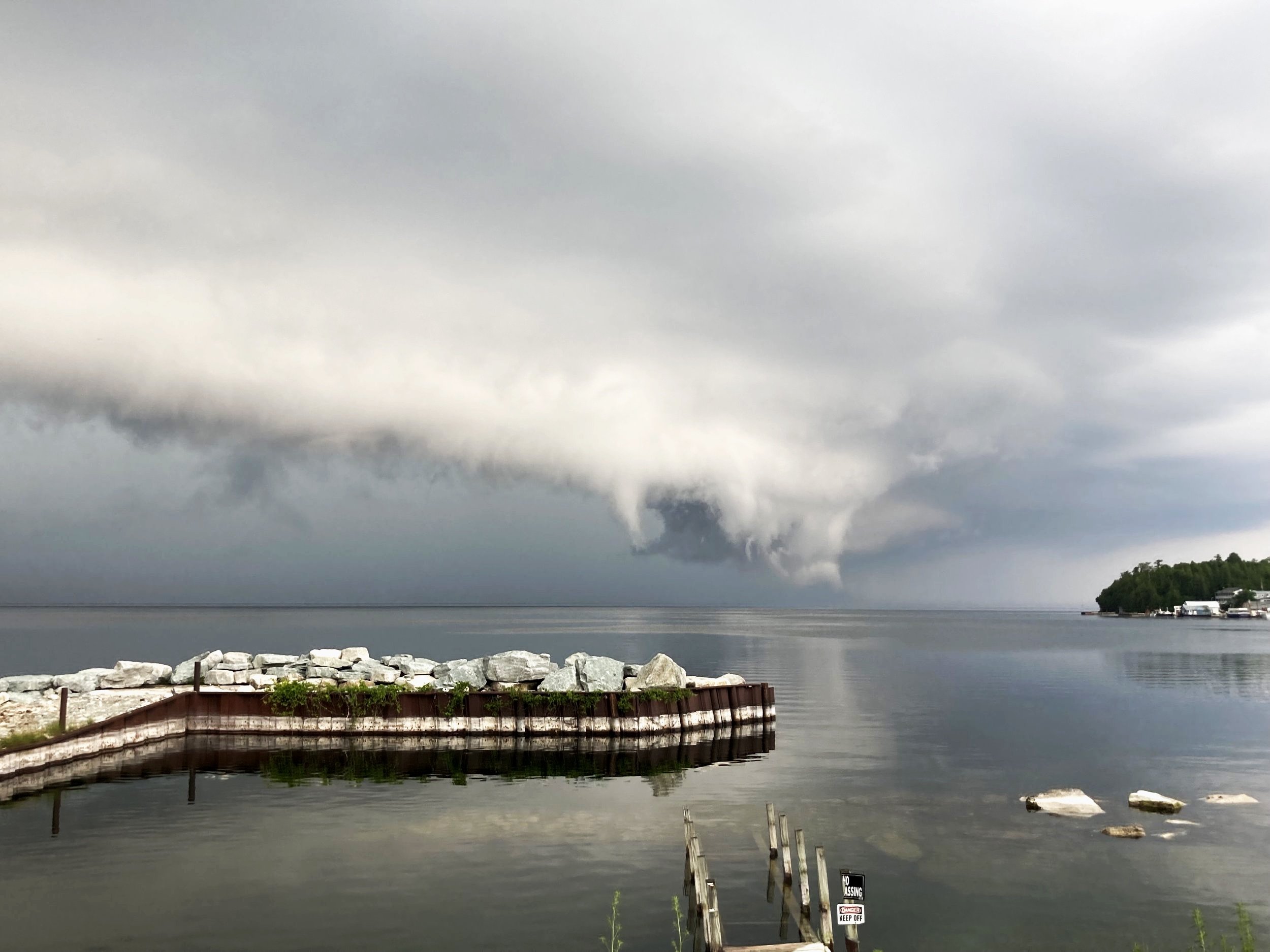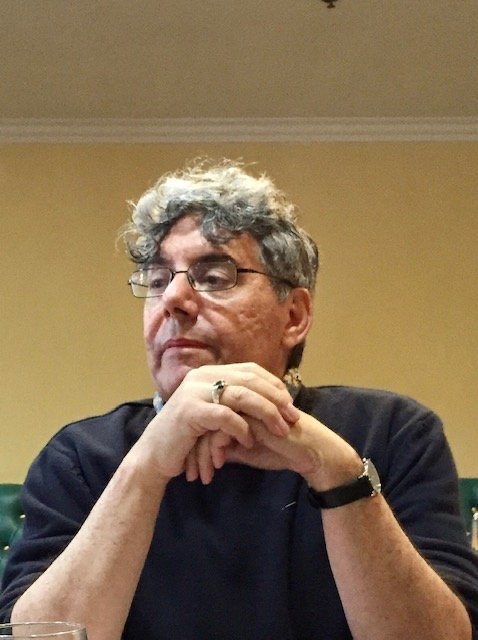
About Suffering
by Stephen Policoff
1.
Here are two pieces of unwanted information you need to gulp down before reading this:
1.) I lost my wife Kate to cancer in 2012. She went into the hospital in February and died in March. The funeral, at St. Joseph’s Church in Greenwich Village, near where we lived for 17 years, was a huge overflow crowd because Kate, a somewhat larger-than-life character, was beloved by many.
An NYU colleague of mine mused, “Apart from Princess Diana and Whitney Houston, I’ve never seen so many people at a funeral.”
But I have zero memory of the funeral; I was so dazed by grief I did not even recognize old friends who showed up at St. Joseph’s.
2.) My older daughter Anna, whom we adopted as a baby in Hangzhou, China, in 1995, was diagnosed in 2000 with the horrific, rare neurogenetic disorder Niemann-Pick C. We were told then she would likely not live past 13. She died at 20, in 2015, three years after Kate.
I was knocked down by these events.
I only got up from this double disaster because I had to.
True, others have suffered as much and more. But comparing your grief to other people’s grief is a pointless exercise. Suffering is always with us, and so is what I came to think of as Grief Advice, much of which is equally, painfully pointless.
2.
In the weeks—and then years—following the loss of Kate and Anna, many, many people said many, many things to me, mostly with good intentions, though occasionally with the kind of thoughtlessness that afflicts those who lack the self-edit function.
I wrote a lot of these things down—because that’s the kind of person I am. Eventually, I stopped doing that. I felt like I had received more counsel than could be absorbed in a single lifetime.
Here are a few things people said to me regarding my grief:
Don’t make any important decisions for at least a year!
(Several people said this to me after Kate died suddenly. This was the easiest advice to follow; I am decision-averse even in the best of times.)
You will survive this because humans are like cockroaches: they can survive anything!
(Arguably true, though not an inspiring thought.)
No one who has not survived this kind of loss will ever understand how you feel!
(Again, probably true, though not an especially useful bit of counseling.)
It’s not like in the movies, where people move on from their pain. No one really gets over losing a child, let alone a wife and child! The pain never really goes away.
(True, though far from a consolation. Some days it feels like my losses are fading, and I can almost imagine a life in which I do not constantly rehearse those dark events; that feeling rarely lasts a day or two, though, and then some memory, some image, a song or a dream or the way the light falls across a tree stirs up the sadness.)
Grief is like weather, you live in it, you notice it sometimes, and sometimes it is just there.
(OK, I said that, and wrote it down at the time, thinking I would use it in something. And I think it’s true, at least for me).
Anna had such a happy childhood. She was lucky to have you and Kate and Jane.
(I guess so. She did have a happy childhood; she was as happy a kid as I have ever known, and those memories are sometimes a salve. We did our best, though I am haunted of course by the handful of times I was angry or overwhelmed or thoughtless with her.)
Anna would have died even sooner if she had stayed in China.
(A somewhat odd way of looking at things but probably true. No one knew until she was five that she suffered from this dreadful, difficult-to-diagnose illness. It makes my heart ache to think of Anna confined to an orphanage, without even the kind of care we managed to get for her.)
At least Anna never had to go through the misery of heartbreak, of learning how cruel people can be, how unfair the world is.
(True, I guess, though also an odd way of looking at things. I think Anna certainly had a glimpse of how unfair the world could be—she adored and desperately missed Kate—though exactly what Kate’s loss meant to her we will never know).
3.
I did not drink myself to death, as one of my friends did following the too-young death of his wife. I never considered suicide—the closest I came was to consider considering it, but it is alien to my temperament. I completely understand why some might plunge into that abyss, but I was either too afraid, too curious about what comes next, or just not given to such drastic acts.
And I had my younger daughter, Jane, to consider. I needed to help her through the morass of loss, and helping her helped me. This is a well-known truth—helping others helps you—though I did not think of it in such terms until much later.
I neither completely withdrew from the world nor threw myself back into it. I never went out much even before the pandemic drove everyone inside. The Beckett phrase my friend Don whispered outside Kate’s hospital room—I can’t go on. I’ll go on.—pretty much sums up my life after Kate and Anna.
Books, art, music, these have always been what I turned to, what Vladimir Nabokov called the consolation of art, though sometimes they didn’t work either, and sometimes I did not wish to be consoled, wished only to remind myself how sad I was.
It is an equally well-known truth that mourning remains the last, desiccated link to those you loved and lost. Sometimes, I did not wish to move on since Kate and Anna could never move on with me. Knowing that you are floundering in grief in no way alters the arguably perverse desire to remain there.
But the weather of grief also coexists with quotidian life, with the chores and pleasures and aggravations that go along with being a human, and this cannot be denied, even when we might wish to.
In his famous poem, “Musée des Beaux Arts,” W.H. Auden reminds us:
About suffering they were never wrong
The old Masters: how well they understood
Its human position: how it takes place
While someone else is eating or opening a window or just walking dully along
I have always found that image a profoundly true and useful way of looking at the world. After Kate died, I felt compelled to go back to the Upper West Side, to see the apartment on
West 87th Street where we lived when we first got married, where we were happy. I was standing there on the forlorn street, looking up at the odd, porthole-like windows of the fifth floor walk-up where we lived. And suddenly, I burst into tears, and several people walking by stared at me as if I might be slightly dangerous. My grief was just something happening on the periphery of their vision, and I appreciated this even in that moment, and laughed an awkward laugh, because, let’s face it, that’s what grief ought to be, the soundtrack of someone else’s life, not yours.
After Anna died, I went out and bought a new mattress. It was not even a conscious thought—I need to feel something new! It was just a reflex: a way to be a moderately normal person, just walking dully along, while suffering swirls in the background.
We had a celebration of Anna’s life in September 2015, at which 65 people crammed into our airless apartment, where food and prosecco and soda and coffee were consumed and spilled, just the sort of event Anna would have loved, and which I cannot recall even a moment of; that day, like Kate’s funeral, is just a blur of all the hands I shook, hugs I received, joyful anecdotes shared.
But isn’t that how it should be?
The blur is the point of such a gathering, so that grief and suffering are juxtaposed with the banal stuff of life, until they are so mingled we can get up and go on, and so that others can be part of this random intertwining of happy/sad memories which is, after all, what remains of those we love, regardless of how much we loved them.
4.
“That’s your advice?” she asked.
She was slumped in the uncomfortable chair next to the desk in my NYU office, a former student who sometimes came by to tell me her troubles. This time, she was grieving a bad breakup. She was vague about details, but her eyes were teary, her face pale.
This was shortly after Anna died, and it seemed like she knew about my losses, possibly because I teach in a small program and for a while it seemed everyone knew about my losses.
“Go back out into the world, that’s it?” she repeated.
“When you can.”
I forced a smile. I was still pretty raw, not really in smiling mode.
“That’s supposed to heal me?”
She was irate, not at me, I think, but at the idea of her loss, at her justifiable fear that no one could say anything about it worth hearing.
“I didn’t say it would heal you.” I was trying hard to be the compassionate guide she was hoping for, but I did not feel especially on point. “I just said you would need to do it. When you’re ready.”
She sighed. “That’s what you did?”
I nodded, a small gesture of affirmation. “Do you remember that poem we read freshman year? The Auden poem about Icarus?”
I slid the book I had been perusing toward her, pointed to “Musée Des Beaux Arts.” I would not have done this with every student, but this one loved poetry, kept elaborate journals, dreamed of a life in art.
“Oh, my God, yes,” she said. She read the poem aloud. “Why?”
“That poem is me,” I said. “Maybe it’s you too?”
She rose, grabbed her purple knapsack as if it were a recalcitrant child. “Am I Icarus? Or am I the sailors who don’t give a shit about the boy falling from the sky?”
“Both, I think.” I was slipping into professorial mode, a little more comfortable for me than Grief Advice mode. “Because I…we…fall and it’s terrible, but we also look at it and sail on, right?”
She gave my arm a squeeze, as if to acknowledge that my useless advice was appreciated. She leaned against the doorway of my office, half in, half out.
“And thinking about this poem helped you?”
“Sort of,” I said.
She shot me a crooked smile. “Sort of,” she murmured and cantered back down the hallway toward her life.
Stephen Policoff's first novel, BEAUTIFUL SOMEWHERE ELSE, won the James Jones Award, and was published by Carroll & Graf in 2004. His 2nd novel, COME AWAY, won the Dzanc Award, and was published by Dzanc Books in 2014. His 3rd novel, Dangerous Blues, will be published in November by Flexible Press. He is currently Clinical Professor of Writing in Global Liberal Studies at NYU. This essay is an excerpt from a memoir-in-progress.
Image provided by author
